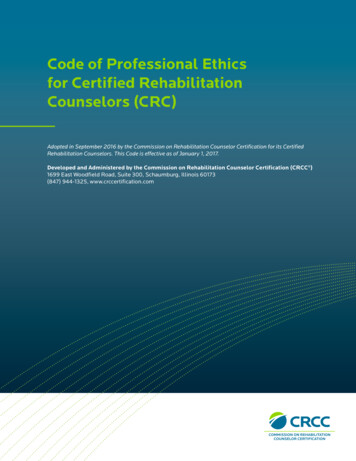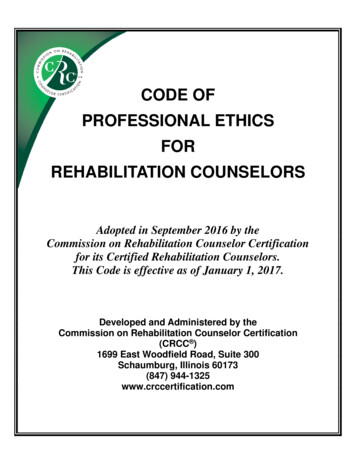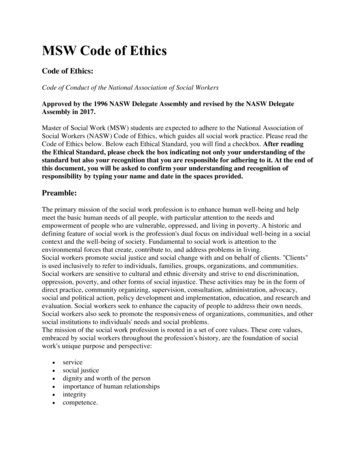
Transcription
CODE OF ETHICSOFTHEN AT I O N A LA S S O C I AT I O NOFSOCIALWORKERS
Code of Ethics of theNational Association of Social WorkersOVERVIEWThe NASW Code of Ethics is intended to serve as a guide to theeveryday professional conduct of social workers. This Code includesfour sections. The first section, “Preamble,” summarizes the socialwork profession’s mission and core values. The second section,“Purpose of the NASW Code of Ethics,” provides an overview of theCode’s main functions and a brief guide for dealing with ethical issuesor dilemmas in social work practice. The third section, “EthicalPrinciples,” presents broad ethical principles, based on social work’score values, that inform social work practice. The final section,“Ethical Standards,” includes specific ethical standards to guide socialworkers’ conduct and to provide a basis for adjudication.The National Association of Social Workers (NASW) is the largestorganization of professional social workers in the world. NASW servessocial workers in 55 chapters throughout the United States, Puerto Rico,the Virgin Islands, Guam, and abroad. NASW was formed in 1955through a merger of seven predecessor social work organizations tocarry out three responsibilities: strengthen and unify the profession promote the development of social work practice advance sound social policies.Promoting high standards of practice and protecting the consumer ofservices are major association principles.Approved by the 1996 NASW Delegate Assembly and revised by theNASW Delegate Assembly in 2017. 2017 National Association of Social Workers. All Rights Reserved.
TPreamblehe primary mission of the social work profession is to enhance humanwell-being and help meet the basic human needs of all people, withparticular attention to the needs and empowerment of people who arevulnerable, oppressed, and living in poverty. A historic and defining featureof social work is the profession’s dual focus on individual well-being in asocial context and the well-being of society. Fundamental to social work isattention to the environmental forces that create, contribute to, and addressproblems in living.Social workers promote social justice and social change with and onbehalf of clients. “Clients” is used inclusively to refer to individuals,families, groups, organizations, and communities. Social workers aresensitive to cultural and ethnic diversity and strive to end discrimination,oppression, poverty, and other forms of social injustice. These activitiesmay be in the form of direct practice, community organizing, supervision,consultation, administration, advocacy, social and political action, policydevelopment and implementation, education, and research and evaluation.Social workers seek to enhance the capacity of people to address their ownneeds. Social workers also seek to promote the responsiveness oforganizations, communities, and other social institutions to individuals’needs and social problems.The mission of the social work profession is rooted in a set of corevalues. These core values, embraced by social workers throughout theprofession’s history, are the foundation of social work’s unique purposeand perspective: service social justice dignity and worth of the person importance of human relationships integrity competence.This constellation of core values reflects what is unique to the socialwork profession. Core values, and the principles that flow from them, mustbe balanced within the context and complexity of the human experience.1
Purpose of the NASW Code of EthicsProfessional ethics are at the core of social work. The profession has anobligation to articulate its basic values, ethical principles, and ethicalstandards. The NASW Code of Ethics sets forth these values, principles, andstandards to guide social workers’ conduct. The Code is relevant to allsocial workers and social work students, regardless of their professionalfunctions, the settings in which they work, or the populations they serve.The NASW Code of Ethics serves six purposes:1. The Code identifies core values on which social work’s missionis based.2. The Code summarizes broad ethical principles that reflect theprofession’s core values and establishes a set of specific ethicalstandards that should be used to guide social work practice.3. The Code is designed to help social workers identify relevantconsiderations when professional obligations conflict or ethicaluncertainties arise.4. The Code provides ethical standards to which the general publiccan hold the social work profession accountable.5. The Code socializes practitioners new to the field to social work’smission, values, ethical principles, and ethical standards.6. The Code articulates standards that the social work profession itselfcan use to assess whether social workers have engaged in unethicalconduct. NASW has formal procedures to adjudicate ethicscomplaints filed against its members.* In subscribing to this Code,social workers are required to cooperate in its implementation,participate in NASW adjudication proceedings, and abide by anyNASW disciplinary rulings or sanctions based on it.The Code offers a set of values, principles, and standards to guidedecision making and conduct when ethical issues arise. It does not providea set of rules that prescribe how social workers should act in all situations.Specific applications of the Code must take into account the context in*For information on NASW adjudication procedures, see NASW Procedures for ProfessionalReview: Revised.2
which it is being considered and the possibility of conflicts among theCode’s values, principles, and standards. Ethical responsibilities flow fromall human relationships, from the personal and familial to the social andprofessional.Furthermore, the NASW Code of Ethics does not specify which values,principles, and standards are most important and ought to outweigh othersin instances when they conflict. Reasonable differences of opinion can anddo exist among social workers with respect to the ways in which values,ethical principles, and ethical standards should be rank ordered when theyconflict. Ethical decision making in a given situation must apply theinformed judgment of the individual social worker and should also considerhow the issues would be judged in a peer review process where the ethicalstandards of the profession would be applied.Ethical decision making is a process. In situations when conflictingobligations arise, social workers may be faced with complex ethicaldilemmas that have no simple answers. Social workers should take intoconsideration all the values, principles, and standards in this Code that arerelevant to any situation in which ethical judgment is warranted. Socialworkers’ decisions and actions should be consistent with the spirit as well asthe letter of this Code.In addition to this Code, there are many other sources of informationabout ethical thinking that may be useful. Social workers should considerethical theory and principles generally, social work theory and research,laws, regulations, agency policies, and other relevant codes of ethics,recognizing that among codes of ethics social workers should consider theNASW Code of Ethics as their primary source. Social workers also shouldbe aware of the impact on ethical decision making of their clients’ and theirown personal values and cultural and religious beliefs and practices. Theyshould be aware of any conflicts between personal and professional valuesand deal with them responsibly. For additional guidance social workersshould consult the relevant literature on professional ethics and ethicaldecision making and seek appropriate consultation when faced with ethicaldilemmas. This may involve consultation with an agency-based or socialwork organization’s ethics committee, a regulatory body, knowledgeablecolleagues, supervisors, or legal counsel.Instances may arise when social workers’ ethical obligations conflictwith agency policies or relevant laws or regulations. When such conflictsoccur, social workers must make a responsible effort to resolve the conflictin a manner that is consistent with the values, principles, and standardsexpressed in this Code. If a reasonable resolution of the conflict does notappear possible, social workers should seek proper consultation beforemaking a decision.3
The NASW Code of Ethics is to be used by NASW and by individuals,agencies, organizations, and bodies (such as licensing and regulatoryboards, professional liability insurance providers, courts of law, agencyboards of directors, government agencies, and other professional groups)that choose to adopt it or use it as a frame of reference. Violation ofstandards in this Code does not automatically imply legal liability orviolation of the law. Such determination can only be made in the contextof legal and judicial proceedings. Alleged violations of the Code wouldbe subject to a peer review process. Such processes are generally separatefrom legal or administrative procedures and insulated from legal reviewor proceedings to allow the profession to counsel and discipline itsown members.A code of ethics cannot guarantee ethical behavior. Moreover, a code ofethics cannot resolve all ethical issues or disputes or capture the richnessand complexity involved in striving to make responsible choices within amoral community. Rather, a code of ethics sets forth values, ethicalprinciples, and ethical standards to which professionals aspire and by whichtheir actions can be judged. Social workers’ ethical behavior should resultfrom their personal commitment to engage in ethical practice. The NASWCode of Ethics reflects the commitment of all social workers to uphold theprofession’s values and to act ethically. Principles and standards must beapplied by individuals of good character who discern moral questions and,in good faith, seek to make reliable ethical judgments.With growth in the use of communication technology in various aspectsof social work practice, social workers need to be aware of the uniquechallenges that may arise in relation to the maintenance of confidentiality,informed consent, professional boundaries, professional competence, recordkeeping, and other ethical considerations. In general, all ethical standards inthis Code of Ethics are applicable to interactions, relationships, orcommunications whether they occur in person or with the use of technology.For the purposes of this Code, technology-assisted social work servicesinclude any social work services that involve the use of computers, mobile orlandline telephones, tablets, video technology, or other electronic or digitaltechnologies; this includes the use of various electronic or digital platforms,such as the Internet, online social media, chat rooms, text messaging,e-mail, and emerging digital applications. Technology-assisted social workservices encompass all aspects of social work practice, includingpsychotherapy; individual, family, or group counseling; communityorganization; administration; advocacy; mediation; education; supervision;research; evaluation; and other social work services. Social workers shouldkeep apprised of emerging technological developments that may be used insocial work practice and how various ethical standards apply to them.4
TEthical Principleshe following broad ethical principles are based on social work’s corevalues of service, social justice, dignity and worth of the person,importance of human relationships, integrity, and competence. Theseprinciples set forth ideals to which all social workers should aspire.Value: ServiceEthical Principle: Social workers’ primary goal is to help people in needand to address social problemsSocial workers elevate service to others above self-interest. Social workersdraw on their knowledge, values, and skills to help people in need and toaddress social problems. Social workers are encouraged to volunteer someportion of their professional skills with no expectation of significantfinancial return (pro bono service).Value: Social JusticeEthical Principle: Social workers challenge social injustice.Social workers pursue social change, particularly with and on behalf ofvulnerable and oppressed individuals and groups of people. Socialworkers’ social change efforts are focused primarily on issues of poverty,unemployment, discrimination, and other forms of social injustice. Theseactivities seek to promote sensitivity to and knowledge about oppressionand cultural and ethnic diversity. Social workers strive to ensure access toneeded information, services, and resources; equality of opportunity; andmeaningful participation in decision making for all people.Value: Dignity and Worth of the PersonEthical Principle: Social workers respect the inherent dignity and worthof the person.Social workers treat each person in a caring and respectful fashion, mindfulof individual differences and cultural and ethnic diversity. Social workerspromote clients’ socially responsible self-determination. Social workers5
seek to enhance clients’ capacity and opportunity to change and to addresstheir own needs. Social workers are cognizant of their dual responsibility toclients and to the broader society. They seek to resolve conflicts betweenclients’ interests and the broader society’s interests in a socially responsiblemanner consistent with the values, ethical principles, and ethical standardsof the profession.Value: Importance of Human RelationshipsEthical Principle: Social workers recognize the central importance ofhuman relationships.Social workers understand that relationships between and among people arean important vehicle for change. Social workers engage people as partnersin the helping process. Social workers seek to strengthen relationshipsamong people in a purposeful effort to promote, restore, maintain, andenhance the well-being of individuals, families, social groups,organizations, and communities.Value: IntegrityEthical Principle: Social workers behave in a trustworthy manner.Social workers are continually aware of the profession’s mission, values,ethical principles, and ethical standards and practice in a manner consistentwith them. Social workers act honestly and responsibly and promote ethicalpractices on the part of the organizations with which they are affiliated.Value: CompetenceEthical Principle: Social workers practice within their areas of competenceand develop and enhance their professional expertise.Social workers continually strive to increase their professional knowledgeand skills and to apply them in practice. Social workers should aspire tocontribute to the knowledge base of the profession.6
TEthical Standardshe following ethical standards are relevant to the professional activitiesof all social workers. These standards concern (1) social workers’ethical responsibilities to clients, (2) social workers’ ethical responsibilitiesto colleagues, (3) social workers’ ethical responsibilities in practice settings,(4) social workers’ ethical responsibilities as professionals, (5) socialworkers’ ethical responsibilities to the social work profession, and (6) socialworkers’ ethical responsibilities to the broader society.Some of the standards that follow are enforceable guidelines forprofessional conduct, and some are aspirational. The extent to which eachstandard is enforceable is a matter of professional judgment to be exercisedby those responsible for reviewing alleged violations of ethical standards.1. SOCIAL WORKERS’ ETHICAL RESPONSIBILITIES TO CLIENTS1.01 Commitment to ClientsSocial workers’ primary responsibility is to promote the well-being ofclients. In general, clients’ interests are primary. However, socialworkers’ responsibility to the larger society or specific legal obligationsmay, on limited occasions, supersede the loyalty owed clients, andclients should be so advised. (Examples include when a social workeris required by law to report that a client has abused a child or hasthreatened to harm self or others.)1.02 Self-DeterminationSocial workers respect and promote the right of clients toself-determination and assist clients in their efforts to identify and clarifytheir goals. Social workers may limit clients’ right to self-determinationwhen, in the social workers’ professional judgment, clients’ actions orpotential actions pose a serious, foreseeable, and imminent risk tothemselves or others.1.03 Informed Consent(a) Social workers should provide services to clients only in the contextof a professional relationship based, when appropriate, on valid informed7
consent. Social workers should use clear and understandable language toinform clients of the purpose of the services, risks related to the services,limits to services because of the requirements of a third-party payer,relevant costs, reasonable alternatives, clients’ right to refuse orwithdraw consent, and the time frame covered by the consent. Socialworkers should provide clients with an opportunity to ask questions.(b) In instances when clients are not literate or have difficultyunderstanding the primary language used in the practice setting, socialworkers should take steps to ensure clients’ comprehension. This mayinclude providing clients with a detailed verbal explanation or arrangingfor a qualified interpreter or translator whenever possible.(c) In instances when clients lack the capacity to provide informedconsent, social workers should protect clients’ interests by seekingpermission from an appropriate third party, informing clients consistentwith their level of understanding. In such instances social workers shouldseek to ensure that the third party acts in a manner consistent withclients’ wishes and interests. Social workers should take reasonable stepsto enhance such clients’ ability to give informed consent.(d) In instances when clients are receiving services involuntarily, socialworkers should provide information about the nature and extent ofservices and about the extent of clients’ right to refuse service.(e) Social workers should discuss with clients the social workers’ policiesconcerning the use of technology in the provision of professional services.(f) Social workers who use technology to provide social work servicesshould obtain informed consent from the individuals using these servicesduring the initial screening or interview and prior to initiating services.Social workers should assess clients’ capacity to provide informedconsent and, when using technology to communicate, verify the identityand location of clients.(g) Social workers who use technology to provide social work servicesshould assess the clients’ suitability and capacity for electronic and remoteservices. Social workers should consider the clients’ intellectual, emotional,and physical ability to use technology to receive services and ability tounderstand the potential benefits, risks, and limitations of such services.If clients do not wish to use services provided through technology, socialworkers should help them identify alternate methods of service.8
(h) Social workers should obtain clients’ informed consent before makingaudio or video recordings of clients or permitting observation of serviceprovision by a third party.(i) Social workers should obtain client consent before conducting anelectronic search on the client. Exceptions may arise when the search isfor purposes of protecting the client or others from serious, foreseeable,and imminent harm, or for other compelling professional reasons.1.04 Competence(a) Social workers should provide services and represent themselvesas competent only within the boundaries of their education, training,license, certification, consultation received, supervised experience, orother relevant professional experience.(b) Social workers should provide services in substantive areas or useintervention techniques or approaches that are new to them only afterengaging in appropriate study, training, consultation, and supervisionfrom people who are competent in those interventions or techniques.(c) When generally recognized standards do not exist with respect to anemerging area of practice, social workers should exercise careful judgmentand take responsible steps (including appropriate education, research,training, consultation, and supervision) to ensure the competence of theirwork and to protect clients from harm.(d) Social workers who use technology in the provision of social workservices should ensure that they have the necessary knowledge and skills toprovide such services in a competent manner. This includes an understandingof the special communication challenges when using technology and theability to implement strategies to address these challenges.(e) Social workers who use technology in providing social work servicesshould comply with the laws governing technology and social workpractice in the jurisdiction in which they are regulated and located and,as applicable, in the jurisdiction in which the client is located.1.05 Cultural Awareness and Social Diversity(a) Social workers should understand culture and its function in humanbehavior and society, recognizing the strengths that exist in all cultures.(b) Social workers should have a knowledge base of their clients’ culturesand be able to demonstrate competence in the provision of services that9
are sensitive to clients’ cultures and to differences among people andcultural groups.(c) Social workers should obtain education about and seek to understandthe nature of social diversity and oppression with respect to race,ethnicity, national origin, color, sex, sexual orientation, gender identityor expression, age, marital status, political belief, religion, immigrationstatus, and mental or physical ability.(d) Social workers who provide electronic social work services should beaware of cultural and socioeconomic differences among clients and howthey may use electronic technology. Social workers should assesscultural, environmental, economic, mental or physical ability, linguistic,and other issues that may affect the delivery or use of these services.1.06 Conflicts of Interest(a) Social workers should be alert to and avoid conflicts of interest thatinterfere with the exercise of professional discretion and impartialjudgment. Social workers should inform clients when a real or potentialconflict of interest arises and take reasonable steps to resolve the issue ina manner that makes the clients’ interests primary and protects clients’interests to the greatest extent possible. In some cases, protecting clients’interests may require termination of the professional relationship withproper referral of the client.(b) Social workers should not take unfair advantage of any professionalrelationship or exploit others to further their personal, religious, political,or business interests.(c) Social workers should not engage in dual or multiple relationships withclients or former clients in which there is a risk of exploitation or potentialharm to the client. In instances when dual or multiple relationships areunavoidable, social workers should take steps to protect clients and areresponsible for setting clear, appropriate, and culturally sensitiveboundaries. (Dual or multiple relationships occur when social workersrelate to clients in more than one relationship, whether professional, social,or business. Dual or multiple relationships can occur simultaneously orconsecutively.)(d) When social workers provide services to two or more people who havea relationship with each other (for example, couples, family members),social workers should clarify with all parties which individuals will beconsidered clients and the nature of social workers’ professional obligations10
to the various individuals who are receiving services. Social workerswho anticipate a conflict of interest among the individuals receivingservices or who anticipate having to perform in potentially conflictingroles (for example, when a social worker is asked to testify in a childcustody dispute or divorce proceedings involving clients) should clarifytheir role with the parties involved and take appropriate action tominimize any conflict of interest.(e) Social workers should avoid communication with clients usingtechnology (such as social networking sites, online chat, e-mail, textmessages, telephone, and video) for personal or non-work-related purposes.(f) Social workers should be aware that posting personal information onprofessional Web sites or other media might cause boundary confusion,inappropriate dual relationships, or harm to clients.(g) Social workers should be aware that personal affiliations may increasethe likelihood that clients may discover the social worker’s presence onWeb sites, social media, and other forms of technology. Social workersshould be aware that involvement in electronic communication withgroups based on race, ethnicity, language, sexual orientation, genderidentity or expression, mental or physical ability, religion, immigrationstatus, and other personal affiliations may affect their ability to workeffectively with particular clients.(h) Social workers should avoid accepting requests from or engaging inpersonal relationships with clients on social networking sites or otherelectronic media to prevent boundary confusion, inappropriate dualrelationships, or harm to clients.1.07 Privacy and Confidentiality(a) Social workers should respect clients’ right to privacy. Social workersshould not solicit private information from or about clients except forcompelling professional reasons. Once private information is shared,standards of confidentiality apply.(b) Social workers may disclose confidential information when appropriatewith valid consent from a client or a person legally authorized to consenton behalf of a client.(c) Social workers should protect the confidentiality of all informationobtained in the course of professional service, except for compellingprofessional reasons. The general expectation that social workers will keep11
information confidential does not apply when disclosure is necessary toprevent serious, foreseeable, and imminent harm to a client or others. Inall instances, social workers should disclose the least amount of confidentialinformation necessary to achieve the desired purpose; only informationthat is directly relevant to the purpose for which the disclosure is madeshould be revealed.(d) If social workers plan to disclose confidential information, theyshould (when feasible and to the extent possible) inform clients aboutthe disclosure and the potential consequences prior to disclosing theinformation. This applies whether social workers disclose confidentialinformation on the basis of a legal requirement or client consent.(e) Social workers should discuss with clients and other interestedparties the nature of confidentiality and limitations of clients’ right toconfidentiality. Social workers should review with clients circumstanceswhere confidential information may be requested and where disclosureof confidential information may be legally required. This discussionshould occur as soon as possible in the social worker–client relationshipand as needed throughout the course of the relationship.(f) When social workers provide counseling services to families, couples,or groups, social workers should seek agreement among the parties involvedconcerning each individual’s right to confidentiality and obligation topreserve the confidentiality of information shared by others. This agreementshould include consideration of whether confidential information may beexchanged in person or electronically, among clients or with othersoutside of formal counseling sessions. Social workers should informparticipants in family, couples, or group counseling that social workerscannot guarantee that all participants will honor such agreements.(g) Social workers should inform clients involved in family, couples,marital, or group counseling of the social worker’s, employer’s, andagency’s policy concerning the social worker’s disclosure of confidentialinformation among the parties involved in the counseling.(h) Social workers should not disclose confidential information tothird-party payers unless clients have authorized such disclosure.(i) Social workers should not discuss confidential information, electronicallyor in person, in any setting unless privacy can be ensured. Social workersshould not discuss confidential information in public or semipublic areassuch as hallways, waiting rooms, elevators, and restaurants.12
(j) Social workers should protect the confidentiality of clients during legalproceedings to the extent permitted by law. When a court of law or otherlegally authorized body orders social workers to disclose confidential orprivileged information without a client’s consent and such disclosurecould cause harm to the client, social workers should request that thecourt withdraw the order or limit the order as narrowly as possible ormaintain the records under seal, unavailable for public inspection.(k) Social workers should protect the confidentiality of clients whenresponding to requests from members of the media.(l) Social workers should protect the confidentiality of clients’ writtenand electronic records and other sensitive information. Social workersshould take reasonable steps to ensure that clients’ records are stored in asecure location and that clients’ records are not available to others whoare not authorized to have access.(m) Social workers should take reasonable steps to protect theconfidentiality of electronic communications, including informationprovided to clients or third parties. Social workers should use applicablesafeguards (such as encryption, firewalls, and passwords) when usingelectronic communications such as e-mail, online posts, online chatsessions, mobile communication, and text messages.(n) Social workers should develop and disclose policies and procedu
social work practice and how various ethical standards apply to them. 4. Ethical Principles The following broad ethical principles are based on social work’s core values of service, social justice, dignity and worth of the person, importance











